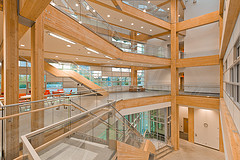Built in response to the global challenge of creating a more sustainable society, the Centre for Interactive Research on Sustainability (CIRS) demonstrates leading- edge green building design technologies, products, and systems.
CIRS is a state-of-the-art “living- lab” in which researchers from leading academic institutions worldwide can conduct interactive research on and assessment of current and future building systems and technologies. Partners from private and public sectors share the facility, working with CIRS researchers to ensure study conducted is connected to real world needs of the community, industry, and policy makers. The outcome of research, product and policy development manifested from CIRS will play a fundamental role in accelerating the path to sustainability.
Designed to exceed LEED Platinum and Living Building Challenge standards, CIRS is one of the few commercial buildings constructed primarily of certified wood and beetle-killed wood (currently B.C.’s largest source of carbon emissions). Its wood structure locks in more than 500 tons of carbon, offsetting the GHG emissions that resulted from the use of other non-renewable construction materials in the building, such as cement, steel and aluminum. Other net-positive qualities include reducing UBC’s carbon emissions, powering itself and a neighboring building with renewable and waste energy, and providing water for inhabitants with rainwater while wastewater is treated onsite.
This 5,700 SM facility houses highly flexible classrooms, laboratories and office space in addition to lecture theatres, a public atrium, exhibition spaces, and a café. Every workspace is daylit, naturally ventilated, with temperature and air under individual control. BD+C
Related Stories
Adaptive Reuse | Oct 22, 2024
Adaptive reuse project transforms 1840s-era mill building into rental housing
A recently opened multifamily property in Lawrence, Mass., is an adaptive reuse of an 1840s-era mill building. Stone Mill Lofts is one of the first all-electric mixed-income multifamily properties in Massachusetts. The all-electric building meets ambitious modern energy codes and stringent National Park Service historic preservation guidelines.
MFPRO+ News | Oct 22, 2024
Project financing tempers robust demand for multifamily housing
AEC Giants with multifamily practices report that the sector has been struggling over the past year, despite the high demand for housing, especially affordable products.
Performing Arts Centers | Oct 21, 2024
The New Jersey Performing Arts Center breaks ground on $336 million redevelopment of its 12-acre campus
In Newark, N.J., the New Jersey Performing Arts Center (NJPAC) has broken grown on the three-year, $336 million redevelopment of its 12-acre campus. The project will provide downtown Newark 350 mixed-income residential units, along with shops, restaurants, outdoor gathering spaces, and an education and community center with professional rehearsal spaces.
Office Buildings | Oct 21, 2024
3 surprises impacting the return to the office
This blog series exploring Gensler's Workplace Survey shows the top three surprises uncovered in the return to the office.
Healthcare Facilities | Oct 18, 2024
7 design lessons for future-proofing academic medical centers
HOK’s Paul Strohm and Scott Rawlings and Indiana University Health’s Jim Mladucky share strategies for planning and designing academic medical centers that remain impactful for generations to come.
Sports and Recreational Facilities | Oct 17, 2024
In the NIL era, colleges and universities are stepping up their sports facilities game
NIL policies have raised expectations among student-athletes about the quality of sports training and performing facilities, in ways that present new opportunities for AEC firms.
Codes and Standards | Oct 17, 2024
Austin, Texas, adopts AI-driven building permit software
After a successful pilot program, Austin has adopted AI-driven building permit software to speed up the building permitting process.
Resiliency | Oct 17, 2024
U.S. is reducing floodplain development in most areas
The perception that the U.S. has not been able to curb development in flood-prone areas is mostly inaccurate, according to new research from climate adaptation experts. A national survey of floodplain development between 2001 and 2019 found that fewer structures were built in floodplains than might be expected if cities were building at random.
Seismic Design | Oct 17, 2024
Calif. governor signs limited extension to hospital seismic retrofit mandate
Some California hospitals will have three additional years to comply with the state’s seismic retrofit mandate, after Gov. Gavin Newsom signed a bill extending the 2030 deadline.
MFPRO+ News | Oct 16, 2024
One-third of young adults say hurricanes like Helene and Milton will impact where they choose to live
Nearly one-third of U.S. residents between 18 and 34 years old say they are reconsidering where they want to move after seeing the damage wrought by Hurricane Helene, according to a Redfin report. About 15% of those over age 35 echoed their younger cohort’s sentiment.

















